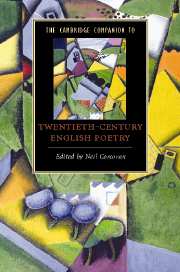7 - The 1930s poetry of W. H. Auden
from Part III - Modernists
Published online by Cambridge University Press: 28 January 2008
Summary
A virtuoso craftsman, Auden is also a poet who communicates a strong sense of an idiosyncratic personal voice. Yet this voice can seem enigmatic in its inflections. In what follows, I shall examine and compare a range of poems from his 1930s work (the term covers poems composed between 1928 and 1939) to examine three issues: whether we can see Auden as maturing beyond or falling away from his early, electrifying stylistic brilliance; whether behind the deft stylist there is a poetic sensibility capable of engagement with his subjects; and whether Auden's poetry conforms to his pronouncement in his 'Introduction' to The Poet's Tongue that 'Poetry is not concerned with telling people what to do, but with extending our knowledge of good and evil, perhaps making the necessity for action more urgent and its nature more clear, but only leading us to the point where it is possible for us to make a rational and moral choice.'
In making that statement, Auden was judiciously asserting his freedom from agitprop ideas of art common in the 1930s, a period remarkable for its political consciousness, its sense that poetry must engage with the pressing realities of its time. Out of the window goes the High Modernist longing, beyond any fragments shored against ruins, for a vanished ideal of aesthetic and political order; in comes a feeling that the true matter for art is the state of society and the individual's relationship with the social. Long gone is 'the Poet's Party', as Auden calls it in part 3 of his witty pastiche-cum-tribute, 'Letter to Lord Byron', a party marked by its elitist disregard for 'all those cattle'; instead, as the party gives way to the hangover (of which the First World War and the Wall Street Crash of 1929 might be regarded as cataclysmic symptoms), 'the sobering few / Are trying hard to think of something new'.
- Type
- Chapter
- Information
- The Cambridge Companion to Twentieth-Century English Poetry , pp. 105 - 116Publisher: Cambridge University PressPrint publication year: 2007
- 1
- Cited by



